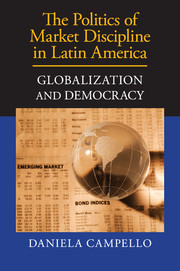Book contents
- Frontmatter
- Dedication
- Contents
- List of Illustrations
- List of Tables
- Acknowledgments
- 1 Globalization, Democracy, and Market Discipline
- 2 Between Votes and Capital: Redistribution and Uncertainty in Unequal Democracies
- 3 Investors' “Vote” in Presidential Elections
- 4 The Politics of Currency Booms and Crises: Explaining the Influence of Investors' “Vote”
- 5 Currency Crisis, Policy Switch, and Ideological Convergence in Brazil
- 6 Exogenous Shocks and Investors' Political Clout in Ecuador
- 7 One President, Different Scenarios: Crisis, Boom, and Market Discipline in Venezuela
- 8 “Vivir con Lo Nuestro”: Default and Market Discipline in Argentina
- 9 Who Governs? Market Discipline in the Developed World
- 10 Conclusion: Markets' Vote and Democratic Politics
- References
- Index
7 - One President, Different Scenarios: Crisis, Boom, and Market Discipline in Venezuela
Published online by Cambridge University Press: 05 April 2015
- Frontmatter
- Dedication
- Contents
- List of Illustrations
- List of Tables
- Acknowledgments
- 1 Globalization, Democracy, and Market Discipline
- 2 Between Votes and Capital: Redistribution and Uncertainty in Unequal Democracies
- 3 Investors' “Vote” in Presidential Elections
- 4 The Politics of Currency Booms and Crises: Explaining the Influence of Investors' “Vote”
- 5 Currency Crisis, Policy Switch, and Ideological Convergence in Brazil
- 6 Exogenous Shocks and Investors' Political Clout in Ecuador
- 7 One President, Different Scenarios: Crisis, Boom, and Market Discipline in Venezuela
- 8 “Vivir con Lo Nuestro”: Default and Market Discipline in Argentina
- 9 Who Governs? Market Discipline in the Developed World
- 10 Conclusion: Markets' Vote and Democratic Politics
- References
- Index
Summary
Venezuela had been experiencing two decades of economic deterioration, when Hugo Chávez was elected in 1998. Since the early 1980s, GDP growth had slowed dramatically, poverty had increased, and income had become more unequally distributed. The percentage of the poor in the population doubled between 1981 and 1999.
Partly as a result of the long economic downturn, these years were also a period of political turmoil, when successive governments proved incapable of dealing with increasing poverty and corruption. The result was a “detachment” between the political bureaucracy and society, not only affecting the image of specific leaders or governments, but also increasing Venezuelans' disillusionment with the political system itself (Buxton 2003; Hellinger 2003; Levine 2001; López Maya 2005; Penfold-Becerra 2001).
The two governments that preceded Chávez's were marked by an unequivocal break with campaign promises (Stokes 2001). Carlos Andrés Pérez, from the Acción Democrática (AD), was elected in 1989 on the vow to revive the golden years of his first presidency (1974–1979), when booming oil revenues were channeled into income redistribution and incentives to domestic industry.
Venezuelans expected a similar agenda in 1989 and were surprised by the announcement of an orthodox program that included harsh austerity measures and prompted widespread popular reaction (Stokes 2001). After two coup attempts, Pérez was finally forced out of office by the Venezuelan Supreme Court on embezzlement charges.
After two years of interim administrations, Venezuelans elected Rafael Caldera, a former member of the Social Christian Party of Venezuela (COPEI), who ran as an independent in 1993. During the campaign, Caldera criticized Pérez's neoliberal agenda and promised to never resort to the International Monetary Fund (IMF) for financial help.
Two years after a persisting currency crisis, Caldera announced a stand-by agreement with the Fund, followed by harsh austerity measures that included a sudden rise in oil prices, a sharp devaluation of the bolívar, an increase in sales taxes, the liberalization of exchange and interest rates, and the opening of the Venezuelan oil sector to foreign investment.
- Type
- Chapter
- Information
- The Politics of Market Discipline in Latin AmericaGlobalization and Democracy, pp. 136 - 158Publisher: Cambridge University PressPrint publication year: 2015

